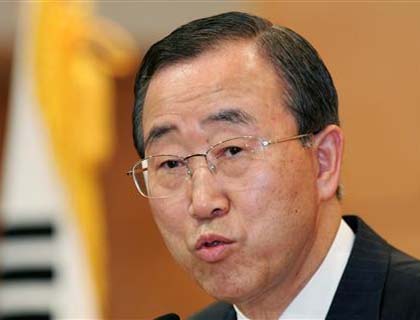WASHINGTON - UN Secretary General Ban Ki-moon, warning that the withdrawal of NATO-led troops would have economic consequences, has urged the international community to redouble its efforts to create sustainable employment and livelihood opportunities in Afghanistan.
"As international military forces reduce their presence, there will be economic consequences. It will, therefore, be vital for efforts to create sustainable employment and livelihood opportunities to be redoubled," Ban said in his quarterly report to the UN Security Council.
The 15-membered powerful wing of the United Nations is scheduled to discuss the report along with the current situation in Afghanistan next week.
Increased government leadership in helping to ensure an orderly transfer was critical, Ban observed, promising the United Nations would, when requested, support the smooth transition of tasks to national authorities to minimize potentially negative impacts.
The secretary general also expressed concern over a decline in humanitarian funding from $900 million in 2011 to $484 million in 2012 (nearly 50 percent). At the same time, the overall development assistance has grown from $4 billion in 2010 to $6.3 billion in 2012.
"I support the call by the humanitarian country team in Afghanistan for donors to earmark at least 10 percent of their official development assistance for humanitarian assistance," he said, indicating that an Afghanistan action plan for 2013, outlining the most acute humanitarian needs and life-saving interventions, would be launched in December.
"It will provide an opportunity to tackle this imbalance and to support the overarching humanitarian objective for 2013 of reinforcing the protection of civilians by responding more effectively to conflict-related needs," he hoped.
Concerned at the rise in civilian casualties during the reporting period, Ban alleged insurgents were intimidating communities and individuals as a deliberate tactic to extend influence and control, targeting those who challenged their authority or ideas.
From August 1 to October 3, civilian casualties increased by 28 percent compared with the same quarter in 2011, in contrast to the downward trend in the first six months of 2012. Overall, in the first 10 months of 2012, a four percent decline in civilian deaths and injuries was recorded, compared with the same period in 2011.
Ban said that political party activity gathered pace with realignments within and between groups in a rapidly-changing environment. On October 4, the Afghan Millat, historically a predominantly Pashtun party, held its sixth congress in Kabul, replacing its long-time leader and Minister of Commerce Anwar-ul-Haq Ahady. (Pajhwok)

